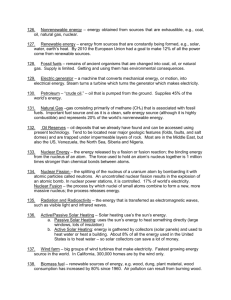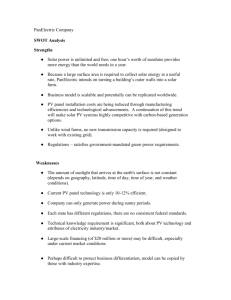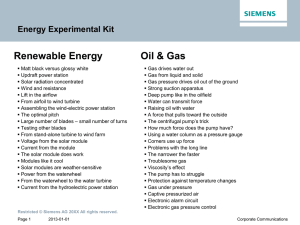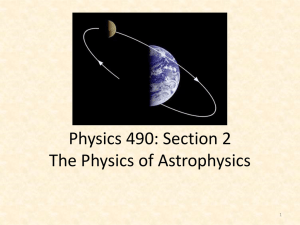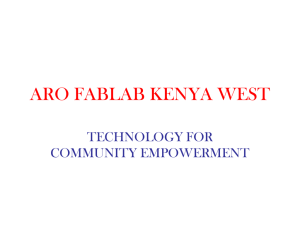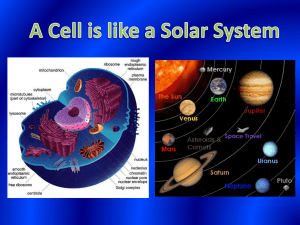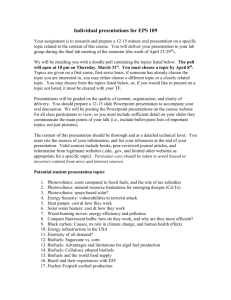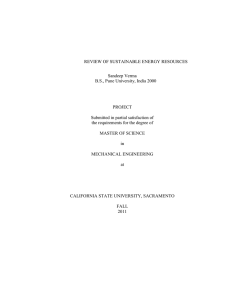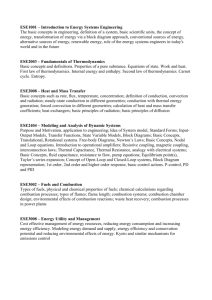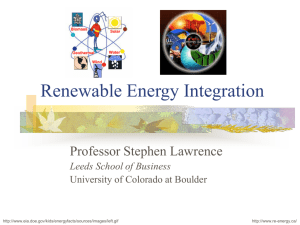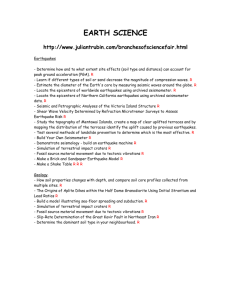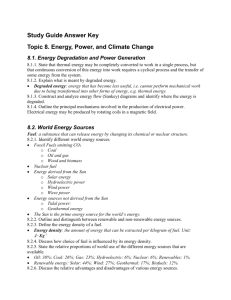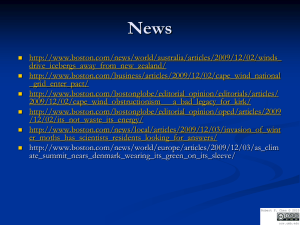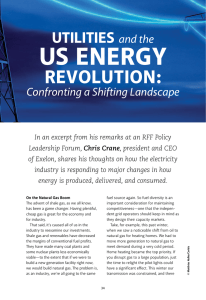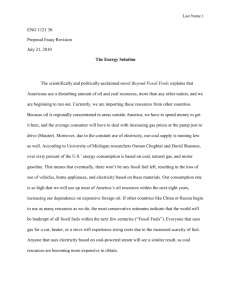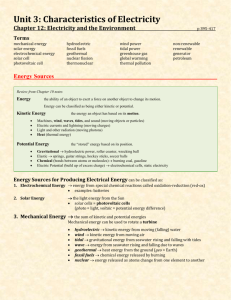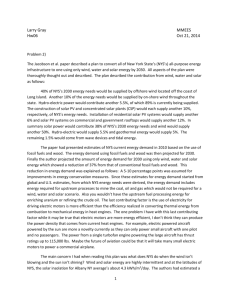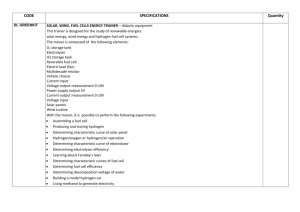FM246 - Mohawk Valley Community College
advertisement
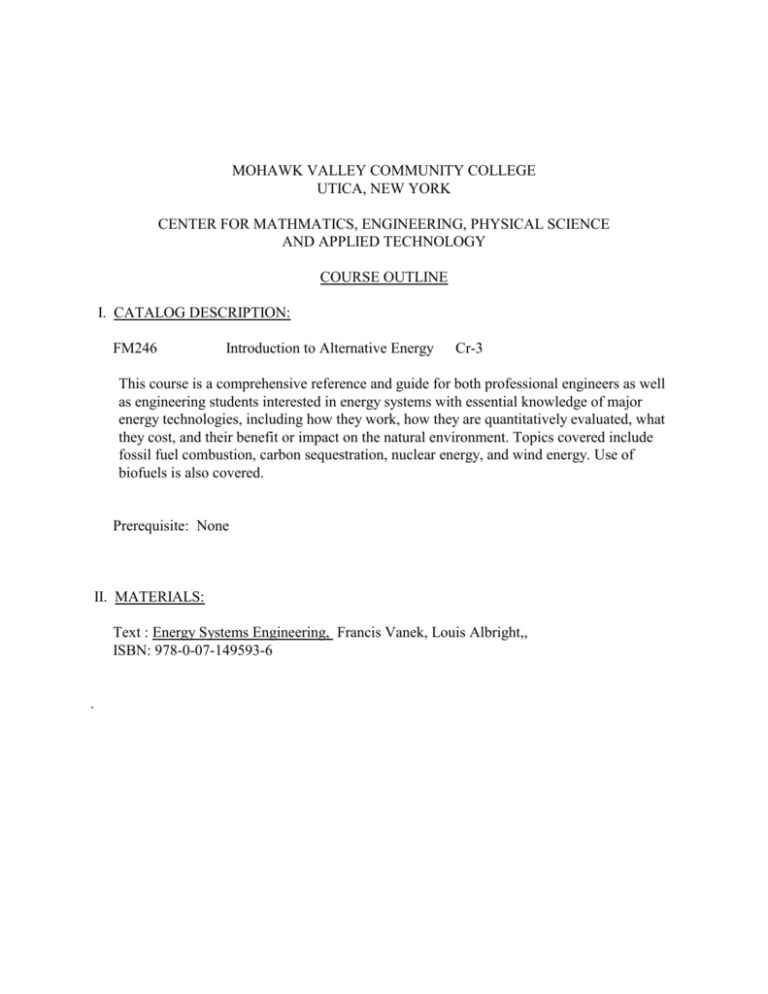
MOHAWK VALLEY COMMUNITY COLLEGE UTICA, NEW YORK CENTER FOR MATHMATICS, ENGINEERING, PHYSICAL SCIENCE AND APPLIED TECHNOLOGY COURSE OUTLINE I. CATALOG DESCRIPTION: FM246 Introduction to Alternative Energy Cr-3 This course is a comprehensive reference and guide for both professional engineers as well as engineering students interested in energy systems with essential knowledge of major energy technologies, including how they work, how they are quantitatively evaluated, what they cost, and their benefit or impact on the natural environment. Topics covered include fossil fuel combustion, carbon sequestration, nuclear energy, and wind energy. Use of biofuels is also covered. Prerequisite: None II. MATERIALS: Text : Energy Systems Engineering, Francis Vanek, Louis Albright,, ISBN: 978-0-07-149593-6 . 2 STUDENT LEARNING OUTCOMES: Upon the completion of this course, the student will be able to: Evaluate a number of alternative energy systems Contrast Energy Systems for Cost and Environmental Benefit Evaluate Efficiencies of Energy Systems Analyze Energy Systems for Consumer Production Discuss Sustainable Development Plans Develop a Life Cycle Cost and Energy Consumption Plan IV. DETAILED COURSE OUTLINE: WK1. Introduction (Chapter 1) A. B. C. D. Historic Growth in Energy Demand Correlation between Energy Use and Wealth Pressure on CO2 Emissions Industrial versus Emerging Countries WK 2. Systems Tools for Energy Systems (Chapter 2) A. B. C. D. Energy Conservation versus Alternative Energy Development The Concept of sustainable Development Steps in the Application of the Systems Approach Life Cycle Analysis and the Sustainable Approach Wk 3 Economic Tools for Energy Systems (Chapter 3) A. B. C. D. The Time Value of Money Evaluation Without Discounting Levelized Cost of Energy Methods of Intervention in Energy WK 4 Climate Change and Climate Modeling (Chapter 4) A. The Greenhouse Effect B. Carbon Cycle and Solar Radiation C. Modeling Climate and Climate Change D. Climate in the Future 3 WK 5. Fossil Fuel Resources (Chapter 5) A. B. C. D. Characteristics of Fossil Fuels Current Rates of Consumption Decarbonization Theory Hubbert Curves WK 6 Stationary Combustion Systems (Chapter 6) A. B. C. D. E. Rankine Vapor Cycle Brayton Gas Cycle Supercritical Cycle Combined Cycle Cogeneration & Combined heat and Power WK 7. Carbon Sequestration (Chapter 7) A. B. C. D. The Photosynthesis Reaction Indirect Sequestration Geological Storage of CO2 Direct Carbon Sequestration WK 8. Nuclear Energy Systems (Chapter 8) A. B. C. D. Nuclear Reactions and Resources Resource Availability Established Reactor Designs Nuclear Energy and Carbon Emissions WK 9 The Solar Resource (Chapter 9) A. B. C. D. Direct, Diffuse and Global Insolation Definition of Solar Geometric Terms Effect of Diffusion on Solar Performance Effect of Surface Tilt on Solar Performance WK 10 Solar Voltaic Technologies (Chapter 10) A. B. C. D. Fundamentals of PV Performance Losses in PV Cells Unit Costs of PV Panels Design and Application of Practical PV Systems WK 11 Solar Thermal Technologies (Chapter 11) A. Flat Plate Collectors B. Evacuated Tube Collectors 4 C. Heat Exchangers and Thermal Storages D. Types of Passive Solar Heating Systems E. Passive Ventilation WK12 Wind Energy Systems (Chapter 12) A. Components of a Turbine B. Alternative Turbine Designs: Horizontal versus Vertical C. Rated Capacity and Capacity Factor D. Analysis of Turbine Blade Design WK 13 Transportation Energy Systems ( Chapter 13) A. Petroleum and Carbon Free Transportation B. Vehicle Performance C. Battery Vehicles D. Hybrid Vehicles E. Biofuels F. Hydrogen Fuel Cells WK 14 Systems Perspective on Transportation Energy A. Passenger Transportation B. Freight Transportation C. Modal Shift to More Efficient Modes D. Units for Measuring Transportation Energy Efficiency WK 15 Creating The Twenty-First Century Energy System A. Summary of Issues Facing Energy Systems B. Other Emerging Technologies Not Previously Considered C. Baseline Scenario Results D. Roles of Energy Professionals.


